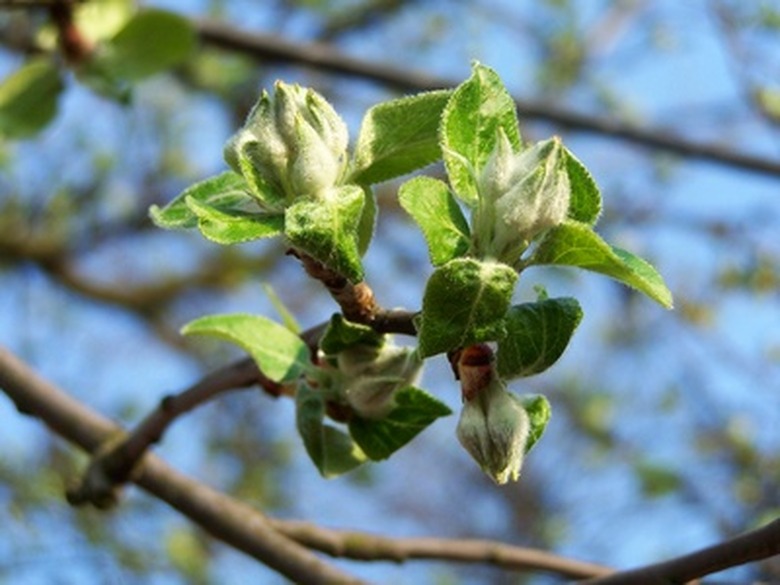Why Do Apple Trees Not Bear Fruit Every Year?
Many species of apple tree will produce fruit every year — provided they're grown in the right conditions and don't sustain any damage. In some situations, your tree may fall into producing fruit only every second year.
Many species of apple tree will produce fruit every year — provided they're grown in the right conditions and don't sustain any damage. In some situations, your tree may fall into producing fruit only every second year. If this happens to your tree, or if it fails to produce one year, it could be for a variety of reasons. And remember: Apple trees won't bear fruit for the first two to five years of growth.
Biennial Bearing
If your tree only bears fruit every two years, it's know as biennial bearing. Several apple cultivars naturally tend toward biennial crops in certain conditions, including Empire, Golden Delicious, Honeycrisp, Spartan and Grimes Golden. The Royal Horticultural Society suggests that biennial bearing is often the result of a lack of moisture in the soil. The low water content means the tree can't produce a large crop, leading to too many flower buds the next year.
- Many species of apple tree will produce fruit every year — provided they're grown in the right conditions and don't sustain any damage.
- The low water content means the tree can't produce a large crop, leading to too many flower buds the next year.
Tree Vigor
The main reason for sporadic apple crops in the home garden is the wrong type of tree vigor, according to Robert Crassweller at Penn State University's Department of Horticulture. Trees that focus their growing energy on branches and stems lack the energy required to produce a proper crop of apples. Overpruning is a chief culprit when it comes to tree vigor problems. Trimming too much in winter, particularly pruning the heads, results in delayed and stunted fruit growth. Similarly, adding too much fertilizer to soil near the tree may trigger wood growth and hamper fruit production.
Pollination
According to the Royal Horticultural Society, most apple trees produce good fruit crops only if they're near a pollination partner. That means that you may struggle to get an annual crop from a single garden tree. Different species have different pollination needs. You should find out what your tree prefers before planting. For example, most require a different variety to cross-pollinate. A lack of bees during bloom time can also reduce the effectiveness of tree pollination.
- The main reason for sporadic apple crops in the home garden is the wrong type of tree vigor, according to Robert Crassweller at Penn State University's Department of Horticulture.
- A lack of bees during bloom time can also reduce the effectiveness of tree pollination.
Frost and Bud Damage
Though many apple trees are hardy and can handle low temperatures, a late frost can kill off early buds. A frost in early May, for example, could destroy more delicate budding shoots. The Royal Horticultural Society also points out that if you can't see any buds at all after winter, your tree could have been stripped by hungry garden birds. In this case, your only form of protection is to net the tree until temperatures warm up and the birds find alternative food sources.
References
- Penn State University Department of Horticulture; Why Is There No Fruit on My Tree?; Robert Crassweller; January 2005
- Purdue University Cooperative Extension Service; Apple Cultivars for Indiana; Peter Hirst and B. Rosie Lerner; February 2003
- Royal Horticultural Society; Unproductive Fruit Trees
- Royal Horticultural Society; Biennial Bearing
